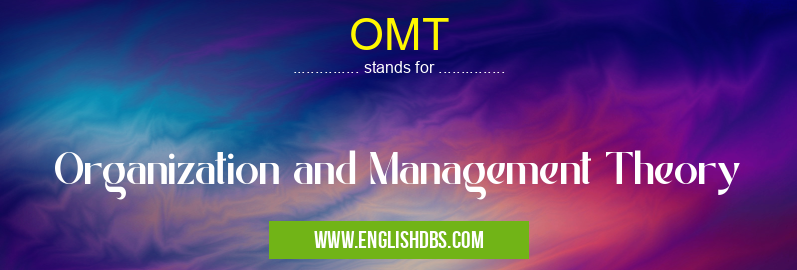What does OMT mean in MANAGEMENT
OMT (Organization and Management Theory) is a field of study that explores the fundamental principles and practices of organizing and managing individuals and organizations to achieve their goals effectively and efficiently. It encompasses a wide range of concepts, theories, and methodologies aimed at understanding and improving the structure, behavior, and performance of organizations.

OMT meaning in Management in Business
OMT mostly used in an acronym Management in Category Business that means Organization and Management Theory
Shorthand: OMT,
Full Form: Organization and Management Theory
For more information of "Organization and Management Theory", see the section below.
» Business » Management
What is OMT?
OMT is the study of organizations and how they are managed. It investigates the internal and external factors that influence organizational behavior and performance, including:
- Organizational structure: The formal arrangement of roles, responsibilities, and reporting relationships within an organization.
- Management processes: The activities and decisions involved in planning, organizing, leading, and controlling an organization.
- Organizational culture: The shared values, beliefs, and norms that shape the behavior of individuals within an organization.
- External environment: The factors outside an organization that influence its operations, such as competition, technology, and government regulations.
OMT Principles
OMT is based on a number of key principles, including:
- Division of Labor: Breaking down tasks into smaller, more manageable units to increase efficiency.
- Authority and Responsibility: Establishing a clear chain of command and assigning appropriate levels of authority and responsibility to individuals.
- Unity of Command: Ensuring that each individual reports to only one superior.
- Span of Control: Limiting the number of subordinates that a single manager can effectively supervise.
- Coordination: Aligning the activities of different individuals and departments to achieve common goals.
Application of OMT
OMT is applied in various aspects of organizational management, such as:
- Organizational Design: Creating an organizational structure that aligns with strategic goals and operational needs.
- Management Development: Training and developing managers to effectively lead and motivate their teams.
- Change Management: Implementing and managing organizational changes to adapt to new challenges and opportunities.
- Performance Management: Evaluating and improving the performance of individuals and organizations.
- Strategic Planning: Developing long-term plans to guide organizational direction and decision-making.
Essential Questions and Answers on Organization and Management Theory in "BUSINESS»MANAGEMENT"
What is Organization and Management Theory (OMT)?
OMT is a discipline that studies the structure, design, and behavior of organizations. It examines how organizations function, how they are managed, and how they interact with their environment.
What are the key elements of OMT?
OMT focuses on concepts such as organizational structure, culture, leadership, decision-making, motivation, and communication. It explores how these elements influence organizational performance and effectiveness.
What are the different perspectives of OMT?
OMT includes various perspectives, including the classical, behavioral, systems, and contingency approaches. Each perspective emphasizes different aspects of organizations and provides unique insights into their functioning.
What are the practical applications of OMT?
OMT principles can be applied in various organizational contexts to improve efficiency, productivity, and employee satisfaction. It helps managers understand and manage organizational dynamics, design effective structures, and foster a positive work environment.
How can OMT help organizations achieve success?
OMT provides a framework for understanding and addressing organizational challenges. By applying OMT principles, organizations can enhance their decision-making processes, improve collaboration, and adapt to changing environments, ultimately leading to improved performance and long-term success.
Final Words: OMT provides a comprehensive framework for understanding and managing organizations. By applying OMT principles and theories, organizations can improve their efficiency, effectiveness, and ability to achieve their goals. Whether it's streamlining processes, enhancing communication, or fostering a positive work environment, OMT offers valuable insights and practical tools for organizational success.
